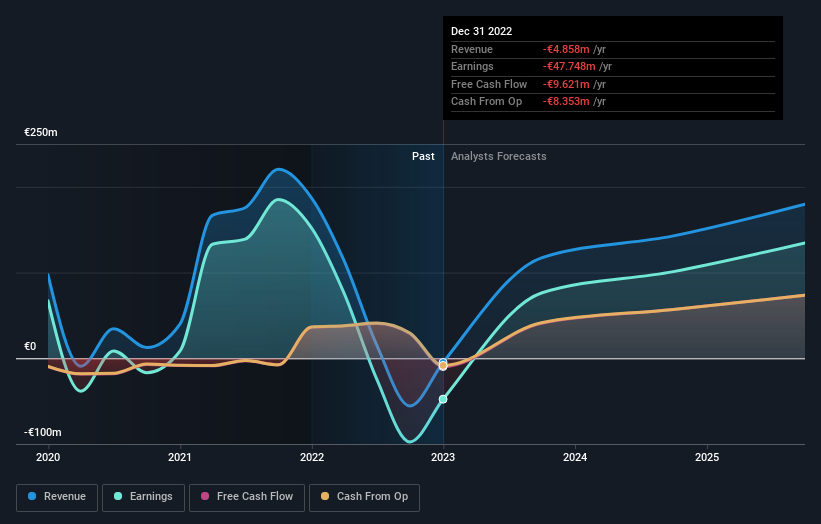While insiders own 32% of Deutsche Beteiligungs AG (ETR:DBAN), individual investors are its largest shareholders with 57% ownership
Key Insights
Significant control over Deutsche Beteiligungs by individual investors implies that the general public has more power to influence management and governance-related decisions
The top 25 shareholders own 42% of the company
Every investor in Deutsche Beteiligungs AG (ETR:DBAN) should be aware of the most powerful shareholder groups. We can see that individual investors own the lion's share in the company with 57% ownership. That is, the group stands to benefit the most if the stock rises (or lose the most if there is a downturn).
Individual insiders, on the other hand, account for 32% of the company's stockholders. Generally speaking, as a company grows, institutions will increase their ownership. Conversely, insiders often decrease their ownership over time.
In the chart below, we zoom in on the different ownership groups of Deutsche Beteiligungs.
Check out our latest analysis for Deutsche Beteiligungs
What Does The Institutional Ownership Tell Us About Deutsche Beteiligungs?
Institutions typically measure themselves against a benchmark when reporting to their own investors, so they often become more enthusiastic about a stock once it's included in a major index. We would expect most companies to have some institutions on the register, especially if they are growing.
As you can see, institutional investors have a fair amount of stake in Deutsche Beteiligungs. This can indicate that the company has a certain degree of credibility in the investment community. However, it is best to be wary of relying on the supposed validation that comes with institutional investors. They too, get it wrong sometimes. It is not uncommon to see a big share price drop if two large institutional investors try to sell out of a stock at the same time. So it is worth checking the past earnings trajectory of Deutsche Beteiligungs, (below). Of course, keep in mind that there are other factors to consider, too.
Deutsche Beteiligungs is not owned by hedge funds. The company's largest shareholder is Dirk Rossmann, with ownership of 25%. Ricardo Portabella is the second largest shareholder owning 6.7% of common stock, and Dimensional Fund Advisors LP holds about 2.8% of the company stock.
Our studies suggest that the top 25 shareholders collectively control less than half of the company's shares, meaning that the company's shares are widely disseminated and there is no dominant shareholder.
While studying institutional ownership for a company can add value to your research, it is also a good practice to research analyst recommendations to get a deeper understand of a stock's expected performance. Quite a few analysts cover the stock, so you could look into forecast growth quite easily.
Insider Ownership Of Deutsche Beteiligungs
The definition of company insiders can be subjective and does vary between jurisdictions. Our data reflects individual insiders, capturing board members at the very least. The company management answer to the board and the latter should represent the interests of shareholders. Notably, sometimes top-level managers are on the board themselves.
Insider ownership is positive when it signals leadership are thinking like the true owners of the company. However, high insider ownership can also give immense power to a small group within the company. This can be negative in some circumstances.
Our most recent data indicates that insiders own a reasonable proportion of Deutsche Beteiligungs AG. It has a market capitalization of just €569m, and insiders have €180m worth of shares in their own names. We would say this shows alignment with shareholders, but it is worth noting that the company is still quite small; some insiders may have founded the business. You can click here to see if those insiders have been buying or selling.
General Public Ownership
The general public -- including retail investors -- own 57% of Deutsche Beteiligungs. This size of ownership gives investors from the general public some collective power. They can and probably do influence decisions on executive compensation, dividend policies and proposed business acquisitions.
Next Steps:
It's always worth thinking about the different groups who own shares in a company. But to understand Deutsche Beteiligungs better, we need to consider many other factors. To that end, you should be aware of the 2 warning signs we've spotted with Deutsche Beteiligungs .
But ultimately it is the future, not the past, that will determine how well the owners of this business will do. Therefore we think it advisable to take a look at this free report showing whether analysts are predicting a brighter future.
NB: Figures in this article are calculated using data from the last twelve months, which refer to the 12-month period ending on the last date of the month the financial statement is dated. This may not be consistent with full year annual report figures.
Have feedback on this article? Concerned about the content? Get in touch with us directly. Alternatively, email editorial-team (at) simplywallst.com.
This article by Simply Wall St is general in nature. We provide commentary based on historical data and analyst forecasts only using an unbiased methodology and our articles are not intended to be financial advice. It does not constitute a recommendation to buy or sell any stock, and does not take account of your objectives, or your financial situation. We aim to bring you long-term focused analysis driven by fundamental data. Note that our analysis may not factor in the latest price-sensitive company announcements or qualitative material. Simply Wall St has no position in any stocks mentioned.
Join A Paid User Research Session
You’ll receive a US$30 Amazon Gift card for 1 hour of your time while helping us build better investing tools for the individual investors like yourself. Sign up here

 Yahoo Finance
Yahoo Finance 

